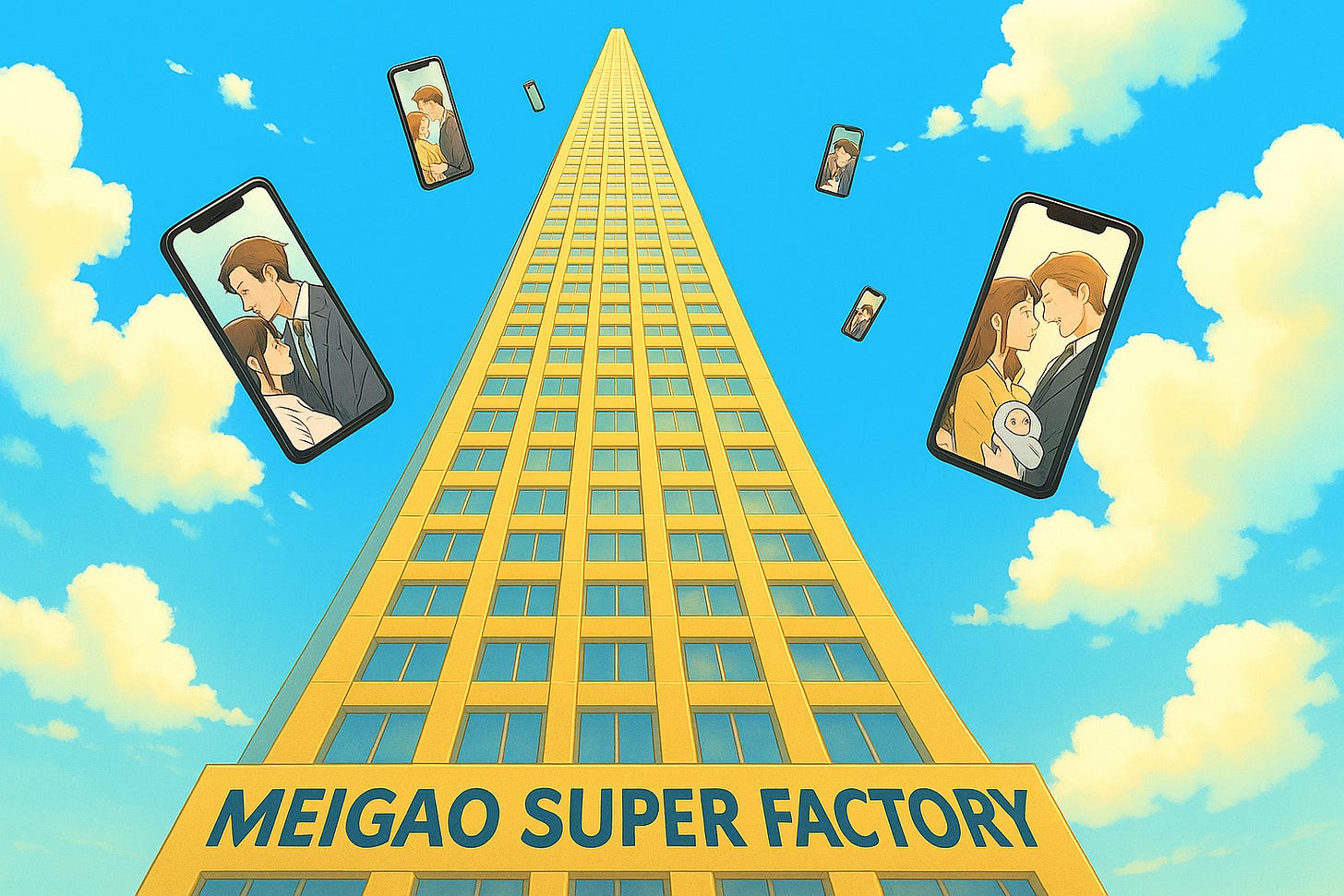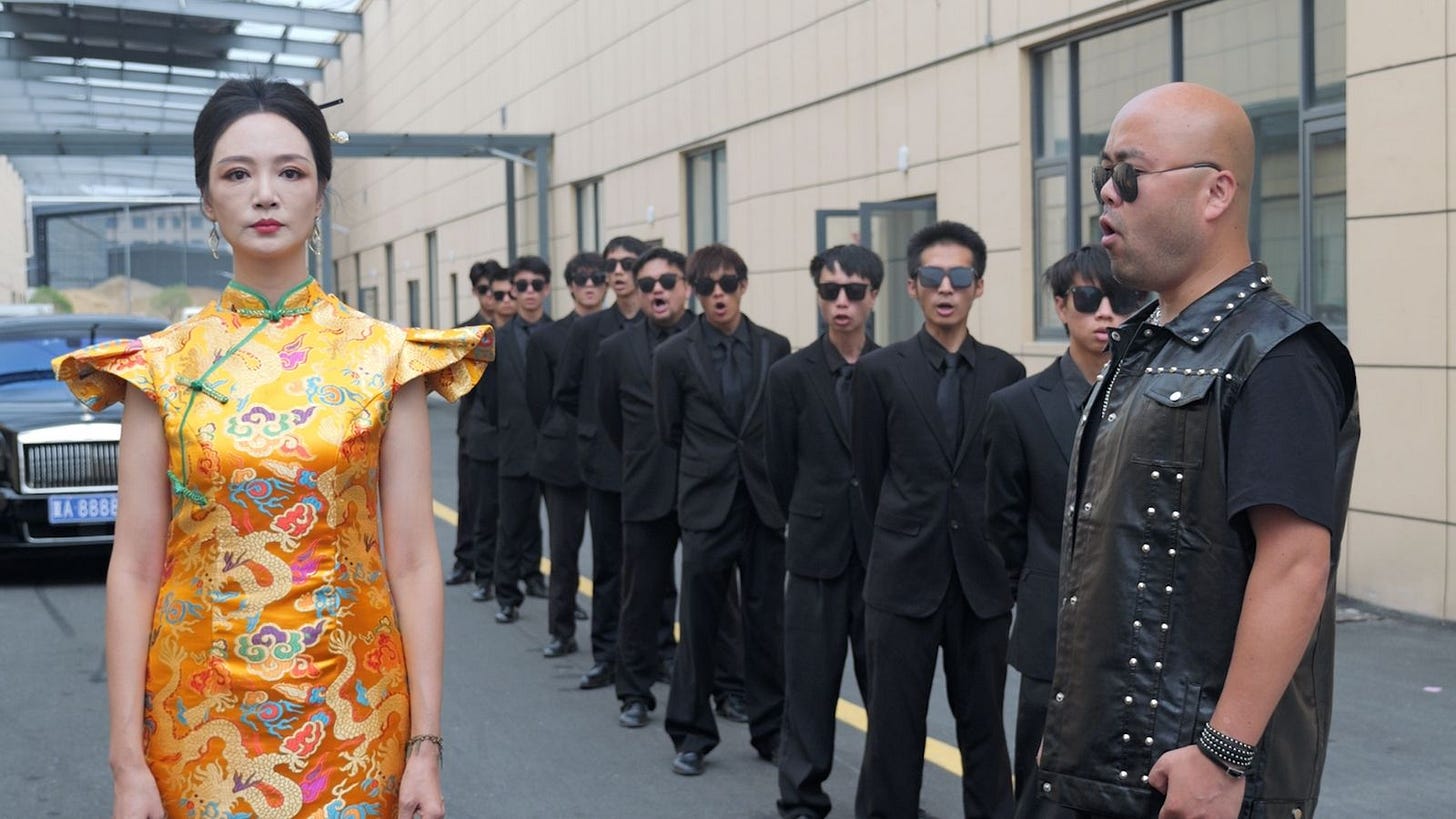Inside the COVID Hotel Factory Fueling China’s $6.9 Billion Micro-Drama Boom
The story of how a COVID hotel became the capital of the world’s newest addiction: 60-second drama.
When Sky News reporters walked through the Meigao Super Factory in Quzhou, China, they entered a compressed hallucination of modern life...
A bank. A courthouse. Subway station. CEO’s office. Police interrogation room. A romantic bedroom.
All within 67,000 square meters of repurposed steel and glass. Over 200 ready-to-shoot sets packed into a single production zone, each one step from the next.
On any given day, 30 different productions film simultaneously.
A crew shoots a wedding in a grand ballroom, then walks 20 feet and films a tense confrontation inside a replica airplane. Five minutes later, they’re in a corporate boardroom.
Less a studio lot. More a content factory. And it’s literally printing money.
The hotel was constructed in 2020 as a COVID quarantine hotel but today, it generates $70 million every six months by mass-producing a new form of digital narcotic: micro-dramas.
Short, addictive, vertically-shot soap operas designed for smartphones. Think TikTok meets telenova.
The titles tell you everything: Ex-Convict Nanny and Billionaire Single Dad. Pregnant by my Tough Daddy CEO. Secret Surrogate to the Mafia King.
Like this one:

 Tiktok failed to load.
Tiktok failed to load.Enable 3rd party cookies or use another browser
But it doesn’t matter. Because these aren’t stories. They’re dopamine engines engineered purely for addiction.
Check-In to the Dream Factory
Dai Wenxue, the factory’s CEO, is a masterful political operator disguised as an entrepreneur. When he spoke to state media he spoke the language of survival.
“The industry’s early phase emphasized growth,” he said, choosing his words carefully.
This is coded language for what everyone knows: the micro-drama boom began as a vulgar, unregulated gold rush. But now, Dai insists, “the focus has shifted toward premium production, cultural exports, and telling compelling Chinese stories.”
Sure it is.
Dai’s publicly signaling to Beijing that his factory is ready to graduate from content mill to respectable tool of state soft power.
Whether Beijing believes him is another question entirely.
Room service for the soul
The micro-drama’s appeal is obvious once you understand the modern attention economy.
Traditional TV episodes demand 45 minutes of focus. A near impossible ask for someone juggling work emails on a subway commute.
These micro-dramas solve a different problem: they deliver complete narrative arcs in the gaps between everything else.
A full episode between subway stops. Three episodes during a ciggie break. Instead of competing with prestige television it’s ruthlessly replacing doomscrolling.
The business model is equally ruthless. The first five to ten episodes are free.
By episode ten, you’re so invested in whether the secret alpha billionaire reveals his identity or whether the fake wife becomes the real one that you’re willing to pay up for more.
The platforms offer two paths forward: watch ads to earn digital coins or pay real money for instant access.
The pricing models are deliberately aggressive with some apps charge $19.99 per week.
Nearly $80 a month for what amounts to mass-produced melodrama. The heavy users, the truly addicted, report spending $10 to $20 weekly.
This high-addiction, high-cost model drove the Chinese micro-drama market to $6.91 billion in 2024 and for the first time in history outpaced China’s entire annual film industry box office.
The Guests and the Ghost Staff
The boom has split the creative class into two distinct camps: opportunists and the disillusioned.
For young directors, particularly women, locked out of traditional film’s rigid, male-dominated hierarchies, the micro-drama gold rush represents a rare meritocratic opening.
The economics are simple: low budgets and insatiable demand mean anyone with technical competence can direct.
There are directors that have already helmed well over 40 productions. Several notching above 100-million-views. Numbers that would be impossible for a newcomer in traditional media.
This industry is an industry that doesn’t care who you are. If you can deliver, you work.
Actually “work” implies something human.
A microdrama crew of 30 might work from 9 a.m. to midnight all to finish an entire 55-episode series in four days.
There’s really no art here, just high-production junk food manufactured at industrial scale.
But even McDonald’s serves a purpose.
America Checks In
ReelShort and DramaBox, the twin titans of the micro-drama export boom, are executing what industry analysts call an America-first playbook. Remaking proven plots with all-Western casts, filming in LA and Atlanta with non-union talent.
The strategy works.
ReelShort has, at times, surpassed Netflix and YouTube in U.S. Apple App Store rankings. The United States provides 60-70% of these apps’ overseas revenue and in the first quarter of 2025 alone, they logged $250 million in global in-app revenue which is four times the previous year.
Call it cultural arbitrage at scale.
Chinese companies take their “rich pool of short drama scripts” and IP already market-tested for addicts and simply re-skin it with Western actors.
They’re profiting from Hollywood’s inefficiencies, shooting 15-20 pages in a single 12-hour day at a fraction of union costs.
Back in Quzhou, CEO Dai Wenxue is watching this global expansion and planning his counter-move as he plots an entire second hotel with solely American-style sets.
Dai can produce English-language content cheaper, faster, and with more control than his competitors.
I mean, why deal with expensive American crews and location fees when you can just build your own America in China?
House Rules
The industry’s biggest threat is the Chinese state itself.
In February 2024, the National Radio and Television Administration announced that over 1,200 micro-drama series had been taken down for vulgarity. The crackdown specifically targeted the industry’s most successful tropes, including exaggerated plotlines and clichéd characters.
Now the NRTA is drafting new regulations and implementing a review system.
Any drama with a budget over $136,729 or touching “sensitive topics” must undergo full national-level review.
This is a direct shot at the industry’s global ambitions.
The $150,000 to $300,000 budgets for American-market productions would all fall under top-tier review by subjecting them to a bureaucratic nightmare that threatens the very “fast and cheap” model that makes them competitive.
It’s a valiant attempt to clean a dirty image but the reality is clear.
The $6.9 billion industry was built on Secret Surrogate to the Mafia King not Loyal Secretary to the Community Leader.
Users paying $19.99 a week for the werewolf romance Fated to My Forbidden Alpha are probably not going to spend a single dollar to learn about Chinese legal theory.
Final Checkout
Already, there are micro studios experimenting with AI-generated scripts, virtual actors, and automated editing pipelines that can churn out 100-episode sagas in under a week.
If Meigao’s “COVID hotel” can house 30 shoots at once, what’s stopping a hundred factories networked across provinces, producing stories round the clock?
The result could be the world’s first truly industrialized culture engine: endless narrative micro-doses, personalized to every viewer’s appetite and ideology.
A future where the boundaries between propaganda and romance blur into one continuous scroll.
And maybe that’s the real cliffhanger.
Not whether the dopamine empire survives Beijing’s oversight, but whether the rest of the world even wants to resist it.
The quarantine hotel was always temporary. But the addiction factory feels permanent. And it’s already franchising.
If you enjoyed reading this story, don’t forget to hit the ❤️ :)





